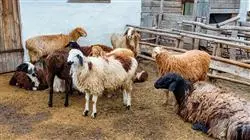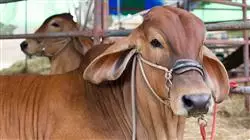University certificate
The world's largest faculty of veterinary medicine”
Introduction to the Program
A complete program that will give you the broadest and most specialized knowledge on the most common affectations and productive consequences in ruminants”

Respiratory system diseases occupy the second place in disease incidence in ruminants. This module groups respiratory diseases together with pathologies of the cardiovascular and hemolymphatic systems.
Although in the diseases of the three systems we find highly variable severity, even in cases that initially appear to be mild, it is common to see rapid deterioration of the individual, marked decrease in production and, in the case of infectious-contagious problems that occupy the first place among respiratory diseases, the possibility of contagion and group affectation, with substantial losses for the producer. Consequently, the rapid recognition of the main diseases affecting the respiratory tract, the cardiovascular system and the lymphatic system is of vital importance for timely intervention to allow early diagnosis and the implementation of control and treatment measures for affected animals, as well as to prevent transmission to other animals (in the case of livestock herds), seeking to minimize losses and restore the health of affected individuals and the entire operation.
Essential yet rare specialization for the specialist veterinary clinician that will set you apart as a specialist in this field of work"
This Postgraduate certificate in Cardiovascular, Respiratory and Hemolymphatic Diseases in Ruminants contains the most complete and up-to-date scientific program on the market. The most important features include:
- The latest technology in Online teaching software
- A highly visual teaching system, supported by graphic and schematic contents that are easy to assimilate and understand
- Practical cases presented by practicing experts
- State-of-the-art interactive video systems
- Teaching supported by telepractice
- Continuous updating and recycling systems
- Autonomous learning: full compatibility with other occupations
- Practical exercises for self-assessment and learning verification
- Support groups and educational synergies: questions to the expert, debate and knowledge forums
- Communication with the teacher and individual reflection work
- Content that is accessible from any fixed or portable device with an Internet connection
- Supplementary documentation databases are permanently available, even after the program
The clinical, specialized and advanced fundamentals, based on veterinary evidence that will allow you to face the daily intervention in cattle and ruminants"
Our teaching staff is made up of professionals from different fields related to this specialty. In this way, TECH makes sure to offer professionals the up-to-date objective it intends. A multidisciplinary team of professionals trained and experienced in different environments who will develop theoretical knowledge efficiently, but, above all, will provide students with practical knowledge derived from their teaching experience: one of the differential qualities of this program.
This mastery of the subject matter is complemented by the effectiveness of the methodological design. Developed by a multidisciplinary team of e-Learning experts, it integrates the latest advances in educational technology. In this way, the student will be able to study with comfortable and versatile multimedia tools that will give them the operability they need in their training.
The design of this program is based on Problem-Based Learning: an approach that conceives learning as a highly practical process. To achieve this remotely telepractice will be used: with the help of an innovative system of interactive videos and learning from an expert they will be able to acquire the knowledge as if they were facing the case they are learning at that moment. A concept that will make it possible to integrate learning in a more realistic and permanent way.
With a methodological design based on proven teaching techniques, this innovative program will take you through different teaching approaches to allow you to learn in a dynamic and effective way"

Supported by evidence, the approach of this program will allow you to learn in a contextual way and acquire the skills you will really need in your daily practice"
Why study at TECH?
TECH is the world’s largest online university. With an impressive catalog of more than 14,000 university programs available in 11 languages, it is positioned as a leader in employability, with a 99% job placement rate. In addition, it relies on an enormous faculty of more than 6,000 professors of the highest international renown.

Study at the world's largest online university and guarantee your professional success. The future starts at TECH”
The world’s best online university according to FORBES
The prestigious Forbes magazine, specialized in business and finance, has highlighted TECH as “the world's best online university” This is what they have recently stated in an article in their digital edition in which they echo the success story of this institution, “thanks to the academic offer it provides, the selection of its teaching staff, and an innovative learning method aimed at educating the professionals of the future”
A revolutionary study method, a cutting-edge faculty and a practical focus: the key to TECH's success.
The most complete study plans on the university scene
TECH offers the most complete study plans on the university scene, with syllabuses that cover fundamental concepts and, at the same time, the main scientific advances in their specific scientific areas. In addition, these programs are continuously being updated to guarantee students the academic vanguard and the most in-demand professional skills. In this way, the university's qualifications provide its graduates with a significant advantage to propel their careers to success.
TECH offers the most comprehensive and intensive study plans on the current university scene.
A world-class teaching staff
TECH's teaching staff is made up of more than 6,000 professors with the highest international recognition. Professors, researchers and top executives of multinational companies, including Isaiah Covington, performance coach of the Boston Celtics; Magda Romanska, principal investigator at Harvard MetaLAB; Ignacio Wistumba, chairman of the department of translational molecular pathology at MD Anderson Cancer Center; and D.W. Pine, creative director of TIME magazine, among others.
Internationally renowned experts, specialized in different branches of Health, Technology, Communication and Business, form part of the TECH faculty.
A unique learning method
TECH is the first university to use Relearning in all its programs. It is the best online learning methodology, accredited with international teaching quality certifications, provided by prestigious educational agencies. In addition, this disruptive educational model is complemented with the “Case Method”, thereby setting up a unique online teaching strategy. Innovative teaching resources are also implemented, including detailed videos, infographics and interactive summaries.
TECH combines Relearning and the Case Method in all its university programs to guarantee excellent theoretical and practical learning, studying whenever and wherever you want.
The world's largest online university
TECH is the world’s largest online university. We are the largest educational institution, with the best and widest online educational catalog, one hundred percent online and covering the vast majority of areas of knowledge. We offer a large selection of our own degrees and accredited online undergraduate and postgraduate degrees. In total, more than 14,000 university degrees, in eleven different languages, make us the largest educational largest in the world.
TECH has the world's most extensive catalog of academic and official programs, available in more than 11 languages.
Google Premier Partner
The American technology giant has awarded TECH the Google Google Premier Partner badge. This award, which is only available to 3% of the world's companies, highlights the efficient, flexible and tailored experience that this university provides to students. The recognition as a Google Premier Partner not only accredits the maximum rigor, performance and investment in TECH's digital infrastructures, but also places this university as one of the world's leading technology companies.
Google has positioned TECH in the top 3% of the world's most important technology companies by awarding it its Google Premier Partner badge.
The official online university of the NBA
TECH is the official online university of the NBA. Thanks to our agreement with the biggest league in basketball, we offer our students exclusive university programs, as well as a wide variety of educational resources focused on the business of the league and other areas of the sports industry. Each program is made up of a uniquely designed syllabus and features exceptional guest hosts: professionals with a distinguished sports background who will offer their expertise on the most relevant topics.
TECH has been selected by the NBA, the world's top basketball league, as its official online university.
The top-rated university by its students
Students have positioned TECH as the world's top-rated university on the main review websites, with a highest rating of 4.9 out of 5, obtained from more than 1,000 reviews. These results consolidate TECH as the benchmark university institution at an international level, reflecting the excellence and positive impact of its educational model.” reflecting the excellence and positive impact of its educational model.”
TECH is the world’s top-rated university by its students.
Leaders in employability
TECH has managed to become the leading university in employability. 99% of its students obtain jobs in the academic field they have studied, within one year of completing any of the university's programs. A similar number achieve immediate career enhancement. All this thanks to a study methodology that bases its effectiveness on the acquisition of practical skills, which are absolutely necessary for professional development.
99% of TECH graduates find a job within a year of completing their studies.
Postgraduate Certificate in Cardiovascular, Respiratory and Hemolymphatic Diseases in Ruminants
At TECH Global University, we offer you the opportunity to acquire specialized knowledge in the field of animal health through our Postgraduate Certificate in Cardiovascular, Respiratory and Hemolymphatic Diseases in Ruminants. This online class program gives you the flexibility to study from anywhere, at your own pace. Virtual lessons have numerous benefits. You will be able to access high quality, up-to-date content on cardiovascular, respiratory and hemolymphatic diseases affecting ruminants, including cattle, sheep and goats. Our learning materials will provide you with an in-depth understanding of these pathologies, their causes, diagnosis and treatments. This Postgraduate Certificate will enable you to develop practical and theoretical skills fundamental to the diagnosis and management of ruminant diseases. You will learn about the most advanced diagnostic imaging techniques, such as ultrasound and radiology, as well as the most effective procedures and therapies to address these diseases.
Become a veterinary expert in ruminant health
At TECH Global University, home of the largest veterinary school in the world, we are proud to have a highly qualified faculty with extensive experience in the field of animal medicine. Our professors will guide you throughout the course, providing you with up-to-date knowledge and sharing their practical experience so that you can apply what you learn in real situations. At the end of the program, you will have acquired the necessary skills to identify and treat cardiovascular, respiratory and hemolymphatic diseases in ruminants, thus improving the quality of life of these animals and contributing to the welfare of the livestock industry. Don't miss the opportunity to expand your knowledge in animal health and become an expert in cardiovascular, respiratory and hemolymphatic diseases in ruminants. Join the Postgraduate Certificate taught by the experts at TECH Global University and make a difference in veterinary medicine.







